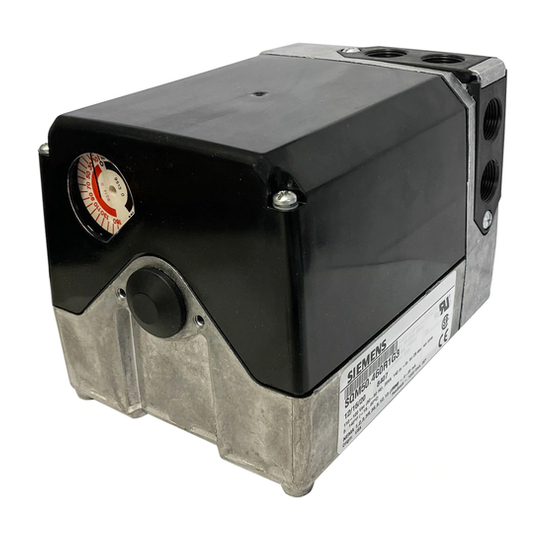Siemens SQM56.667R1A3R Instructions techniques - Page 15
Parcourez en ligne ou téléchargez le pdf Instructions techniques pour {nom_de_la_catégorie} Siemens SQM56.667R1A3R. Siemens SQM56.667R1A3R 31 pages. Reversing
Également pour Siemens SQM56.667R1A3R : Instructions techniques (31 pages), Instructions techniques (31 pages)

SQM5... Reversing Actuators
Modulation Adjustment
See Figures 10 and 12.
Zero Adjustment
Span Adjustment
Figure 13. Switch cam and Trim
Siemens Building Technologies, Inc.
The blue trim potentiometers allow the adjustment of the minimum (zero) and
maximum (span) positions.
The factory setting of the MIN trim potentiometer is rotated fully counter clockwise.
The factory setting of the MAX trim potentiometer is rotated fully clockwise.
Set the OPE/MAX/MIN slide switch to MIN. The blue MIN trim potentiometer can now
be gently adjusted to the required minimum position. Return the OPE/MAX/MIN slide
switch to OPE for operation.
NOTE:
Do not set switch cam I higher than:
90° when using feedback potentiometers ASZxx.30
135° when using feedback potentiometers ASZxx.33
Set the OPE/MAX/MIN slide switch to MAX. The blue MAX trim potentiometer can now
be gently adjusted to the required maximum position. Return the OPE/MAX/MIN slide
switch to OPE for operation.
Example of limit switch I and III
and trim potentiometer settings
Potentiometer Setting.
NOTE:
The actual minimum and maximum
modulating range is determined either
by the setting of the MIN and MAX trim
potentiometers or the setting of switch
cam III (Minimum) and switch cam I
(Maximum). The actuator can never
modulate outside of the range set by
switch cam I and III. If the MIN and MAX
trim potentiometers are set outside the
setting range of switch cams I and III,
then the switch cam settings determine
the modulating range. If a soft stop is
desired, the modulating range can be
defined by the trim potentiometers if the
MIN and MAX trim potentiometers are
set inside the setting range of switch
0 deg.
cams I and III. See the example in
Figure 13.
Technical Instructions
Document No. 155-517P25
July 9, 2007
Page 15
